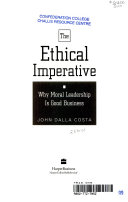

The book begins by establishing the importance of ethical decision-making in both personal and professional contexts. It argues that ethics should not be an afterthought but rather a foundational element of all business practices. Ethical decision-making involves evaluating the consequences of actions, understanding the moral implications, and recognizing the impact on stakeholders. The author emphasizes that ethical considerations lead to better long-term outcomes, fostering trust and loyalty among customers and employees. By integrating ethics into the decision-making process, organizations can navigate complex situations more effectively and build a sustainable business model.
Continue readingAnother central theme is the concept of Corporate Social Responsibility (CSR). The book discusses how businesses have a duty to contribute positively to society beyond profit generation. It highlights the importance of aligning business goals with social good, advocating for practices that benefit the community and the environment. The author provides examples of companies that have successfully integrated CSR into their operations, demonstrating that ethical practices can lead to enhanced brand reputation and customer loyalty. The discussion emphasizes that consumers are increasingly demanding transparency and accountability from brands, making CSR not just a moral obligation but a competitive advantage.
Continue readingLeadership plays a pivotal role in fostering an ethical culture within organizations. The book explains that leaders must model ethical behavior and create an environment where ethical considerations are prioritized. This involves establishing clear values, providing training on ethical dilemmas, and encouraging open dialogue about ethical issues. The author argues that when leaders demonstrate a commitment to ethics, it inspires employees to act similarly. The text also addresses the challenges leaders face in maintaining ethical standards, particularly in high-pressure environments, and offers strategies for overcoming these obstacles.
Continue readingIn an increasingly digital world, the intersection of technology and ethics is a significant focus of the book. The author explores the ethical implications of emerging technologies such as artificial intelligence, data privacy, and automation. The discussion highlights the potential risks and benefits of technology, urging businesses to consider the ethical ramifications of their technological choices. The book advocates for a proactive approach to technology ethics, encouraging organizations to develop guidelines and frameworks that prioritize ethical considerations in tech development and implementation, ensuring that innovations serve the greater good.
Continue readingEffective stakeholder engagement is essential for ethical business practices. The author emphasizes the importance of understanding and addressing the needs and concerns of various stakeholders, including employees, customers, suppliers, and the community. The book outlines strategies for engaging stakeholders in meaningful ways, such as conducting surveys, hosting forums, and actively seeking feedback. By fostering open communication and collaboration, organizations can build stronger relationships with stakeholders, leading to more ethical decision-making and improved business outcomes.
Continue readingThe book argues that ethical practices yield long-term benefits that outweigh short-term gains. It presents case studies of companies that have prioritized ethics and subsequently reaped rewards in terms of customer loyalty, employee satisfaction, and brand reputation. The author advocates for a shift in mindset, encouraging businesses to view ethical practices as an investment rather than a cost. By committing to ethical behavior, organizations can cultivate a sustainable competitive advantage that contributes to their overall success and resilience in the face of challenges.
Continue readingFinally, the book concludes with a practical guide to creating an ethical framework within organizations. It outlines the steps necessary to develop and implement an ethics program, including defining core values, establishing policies, providing training, and measuring ethical performance. The author stresses the importance of continuous improvement and adaptation in maintaining an ethical framework, encouraging organizations to stay vigilant and responsive to changing ethical standards and societal expectations. This framework serves as a roadmap for organizations seeking to embed ethics into their culture and operations.
Continue readingThe reading time for The Ethical Imperative depends on the reader's pace. However, this concise book summary covers the 7 key ideas from The Ethical Imperative, allowing you to quickly understand the main concepts, insights, and practical applications in around 24 min.
The Ethical Imperative is definitely worth reading. The book covers essential topics including The Foundation of Ethical Decision-Making, Corporate Social Responsibility (CSR), The Role of Leadership in Ethical Culture, providing practical insights and actionable advice. Whether you read the full book or our concise summary, The Ethical Imperative delivers valuable knowledge that can help you improve your understanding and apply these concepts in your personal or professional life.
The Ethical Imperative was written by John Dalla Costa.
If you enjoyed The Ethical Imperative by John Dalla Costa and want to explore similar topics or deepen your understanding, we highly recommend these related book summaries:
These books cover related themes, complementary concepts, and will help you build upon the knowledge gained from The Ethical Imperative. Each of these summaries provides concise insights that can further enhance your understanding and practical application of the ideas presented in The Ethical Imperative.